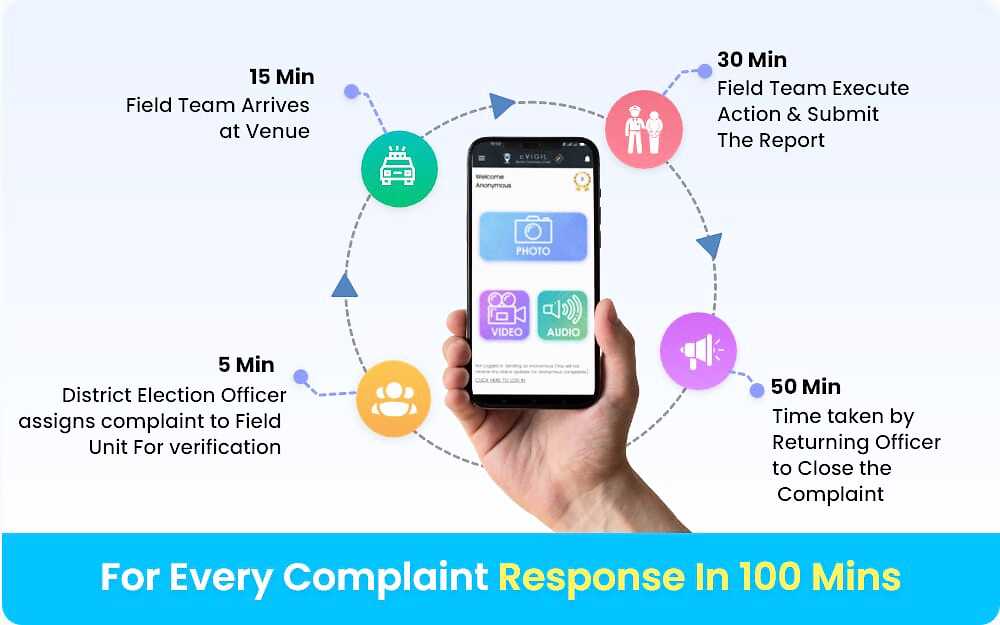
views
Historical challenges in the enforcement of MCC
The Model Code of Conduct (MCC) is a set of guidelines issued by the Election Commission of India (ECI) to govern the conduct of political parties and candidates. It comes into operation right from the time and day the Election Commission announces the election schedule till the completion of the election process. It aims to ensure free, fair, and transparent elections by maintaining a level playing field for all candidates and parties.
Electorates’ scale, spread and remoteness preclude direct oversight by the ECI. In this context, the Commission depends upon vigilant citizens to be its eyes and ears when reporting violations of the MCC at the ground level. Despite the MCC’s importance, its enforcement has historically faced several challenges.
Before introducing technological solutions, the system for reporting violations was cumbersome and inefficient. The traditional method required citizens to physically visit the returning officer’s office in their Assembly constituency to file reports of MCC violations, which was time-consuming and inaccessible for many. It also led to delays in addressing complaints. Furthermore, the lack of immediate and verifiable evidence in the form of photographs or videos meant that many complaints could not be substantiated, leading to potential violators evading detection and their possible resolution. This inefficiency was compounded by the country’s vast geography and the difficulty of timely reporting from remote locations, allowing violators to escape detection.
The system’s reliance on manual reporting also opened the door to spurious complaints, which wasted the time and resources of field verification units and diluted the efficacy of enforcement efforts.
100 minutes complaint resolution through cVIGIL
In response to these challenges, the ECI developed the cVIGIL mobile application, an acronym for “Vigilant Citizen”. Designed to bridge the gap between the vigilant public and the election authorities, cVIGIL empowers citizens to report violations directly from their smartphones.
The workflow of cVIGIL is straightforward. Upon witnessing an MCC violation, a citizen captures the time-stamped geo-tagged photo/video of the violation using the app. The complaint is immediately forwarded to the District Control Room, which has 5 minutes to assign it to a field unit for further investigation. Field units equipped with the cVIGIL investigator app are tasked with reaching the incident location within 15 minutes to assess and act on the report within the next 30 minutes. Following their investigation, field units submit their findings to the returning officer, who decides on the appropriate action based on the evidence provided. This entire process is designed to be completed within a stringent timeline of 100 minutes, illustrating the app’s commitment to rapid response.

Advanced features
Regarding accessibility, cVIGIL supports multiple languages, ensuring broader usability across diverse linguistic groups. Its user-friendly interface simplifies the reporting process for citizens, who can log in anonymously or register with personal details, which allows tracking. The app’s reliance on smart GPS technologies enhances the accuracy of location-based reporting, thereby aiding the swift mobilisation of field units to the reported sites. The application also serves as a tool for election observers to monitor MCC violation complaints through the cVIGIL Observer app.
To prevent misuse and ensure the integrity of the reporting mechanism, cVIGIL incorporates several inbuilt features. Notably, it restricts submissions to live photos or videos taken within the app, thereby avoiding the upload of pre-recorded or irrelevant content. Users are given a five-minute window to report an incident after capturing it, a measure that helps to maintain the relevance and immediacy of complaints. Moreover, the app becomes inactive outside election-bound states, further aligning its use with the election schedule.
MCC violations
It displays a list of these likely MCC violations: money distribution, gifts/coupons distribution, liquor distribution, posters/banners without permission, display of firearms, intimidation, vehicles or convoys without permission, paid news, property defacement, transportation of voters on polling day, campaigning within 200 metres of the polling booth, campaigning during the ban period, religious or communal speeches/messages, use of speakers beyond the permitted time, putting posters without a declaration, and transportation of public for rallies.
As of May 18, 4.24 lakh complaints have been received since the announcement of the 2024 general elections. Over 99.9 per cent of these complaints were resolved, and close to 89 per cent were resolved within 100 minutes. 3.24 lakh complaints were against illegal hoardings and banners, 14,022 were related to property defacement, 7022 were related to the distribution of cash, liquor & freebies, and 4742 were reported for campaigning beyond the prohibited period.
The app is among the armoury of apps built by the EC to leverage technology and facilitate voters and political parties. It marks a significant advance in promoting transparent and fair elections by giving the common man power similar to that of an election observer. This approach not only simplifies the process of lodging complaints but also aims to improve the accessibility, reliability, and speed of the complaint management system.
The initiative also suggests a model for broader governance applications, pointing towards the potential for such collaborative, transparent and technology-driven solutions to streamline grievance redressal across different sectors and geographies.
Dr Ravi Mittal is a District Collector, Jashpur, Chhattisgarh; Rajat Bansal is an IAS officer serving in Chhattisgarh. Views expressed in the above piece are personal and solely that of the author. They do not necessarily reflect News18’s views.




















Comments
0 comment